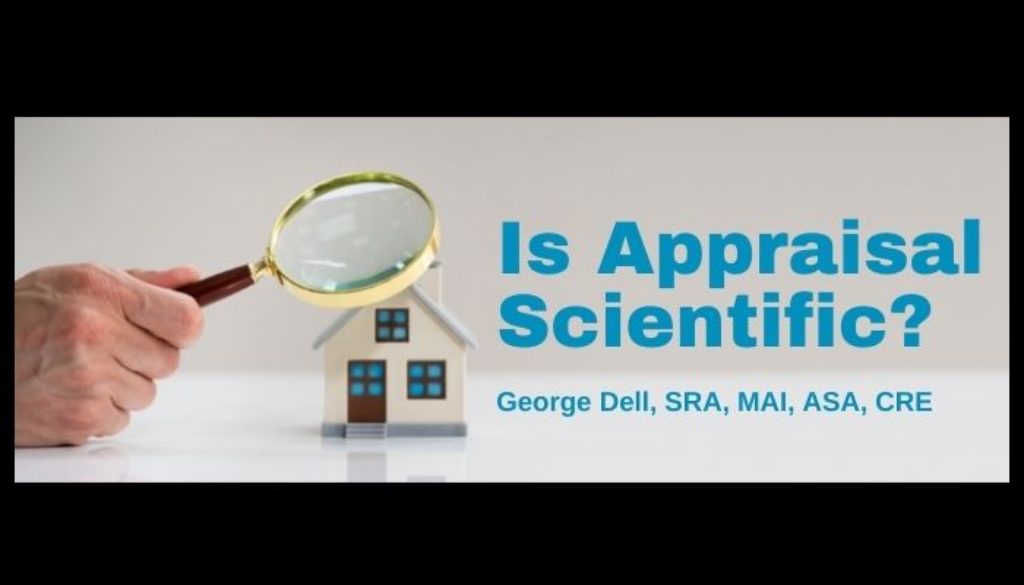“Appraisal is not an exact science” are words I used to hear a lot. This understandable view leaves much to be explained.
In the USA, appraisal is an opinion of value by an appraiser. (Licensed, and when required, for “federally related transactions”.) All other types of valuations have different or no regulations. However, they are often subject to one of the (several) alternate “standards” (different from the privately published, government-subsidized Appraisal Foundation standards).
Such appraisal work is usually ‘exact’ in that a point-value is provided with no estimate of sureness. This may justify the words “not an exact science” because no exactness is claimed, only exact opinion.
And what is “scientific”? Presumably it means following the process and principles of the scientific method. Simply put, “science is the systematic study by an expert in the field.” The overall process itself is straightforward:
- Hypothesis, like scope of work;
- Data selection, like picking comps;
- Analysis, like making adjustments;
- Presentation, like narratives, tables, and forms.
The way I learned to appraise was appropriate for the time. The MAI office where I first trained emphasized the importance of picking good comps. Similar and competitive. It was always a tradeoff between quality (via verification and personal contact) – or convenience. It was very convenient when I had previously used a sale. Or a friend or other appraiser in the office or at the AI Chapter meeting was available. We shared data. We had community.
We selected comps because of convenience or their completeness as well as similarity. We hadn’t heard of ‘scope of work’ but knew about highest and best use. We based adjustments on experience and “paired-sales” analysis (which always seemed to work perfectly). We explained why the ‘approaches to value’ disagreed by explaining the disagreements, then wrote a ‘correlation’ of the three approaches.
I conclude that the “appraisal process” was scientific for its time. We had difficult, sparse, and subjective ‘collection’ in the past. This method remains good in areas where data is non-disclosure or otherwise opaque.
In most areas of the US (and developed nations), data is relatively complete. This is a big change. Now there’s no reason to apply manual “picking of comps” based on subjective judgment. We can let the data speak for themselves. And let the data speak to us.
Modernized methods focus on the complete data, which focuses us on measuring markets instead of comparing comps. Modernizing methods allow the appraiser to dramatically sharpen professional judgment. Modernized methods simplify ‘adjustments’ by applying one of the three basic predictive algorithms. Algorithms: easy to learn, easy to apply, and clear to explain.
Today’s Evidence Based Appraisal (EBA)© approach optimizes appraiser knowledge and judgement. It does not replace the appraiser.
The old ways hold back the profession, as well as lenders, investors, and equity enforcers. The public trust is better served by active endorsement of today’s process technologies. We need it now.

August 11, 2021 @ 8:39 am
Appraisal theory borrows heavily from the work of a group of 19th century economists called the “marginalists.” Anyone who took a class in microeconomics in college studied the theoretical basis on which the appraisal profession relies. One of the key assumptions the marginalists made was that people are rational in the decisions they make. This is why our definition of market value presupposes that the people involved are acting prudently and knowledgably, and are well informed and well advised. Anyone who has sold homes for a while knows that this is what one of my college professors called a “heroic assumption.” It assumes the very best about human nature, and often there is abundant evidence to the contrary. As long as appraisal is an opinion, and as long as it relies on theories about economic activity that are not in themselves scientific, I don’t see how appraisal can be scientific. However, opinions can be informed or uninformed and credible or not credible. My eight year old has opinions about real estate values, but they are neither informed nor credible.